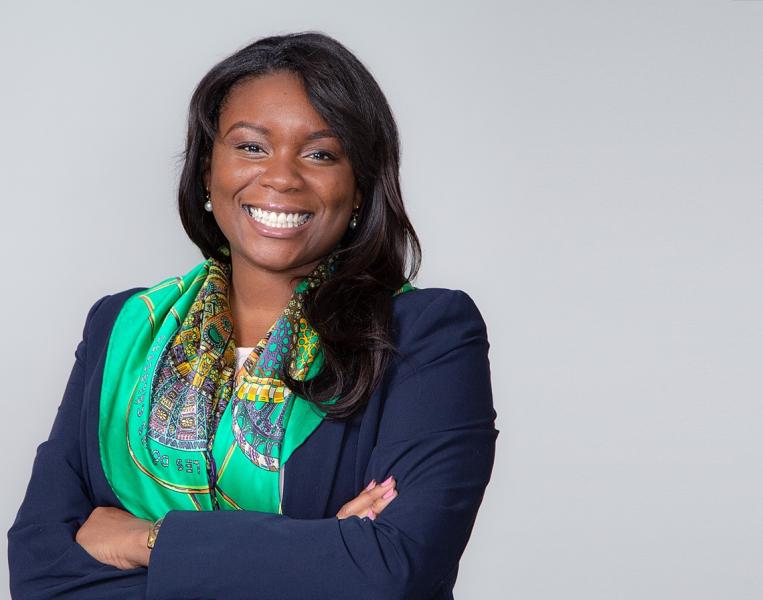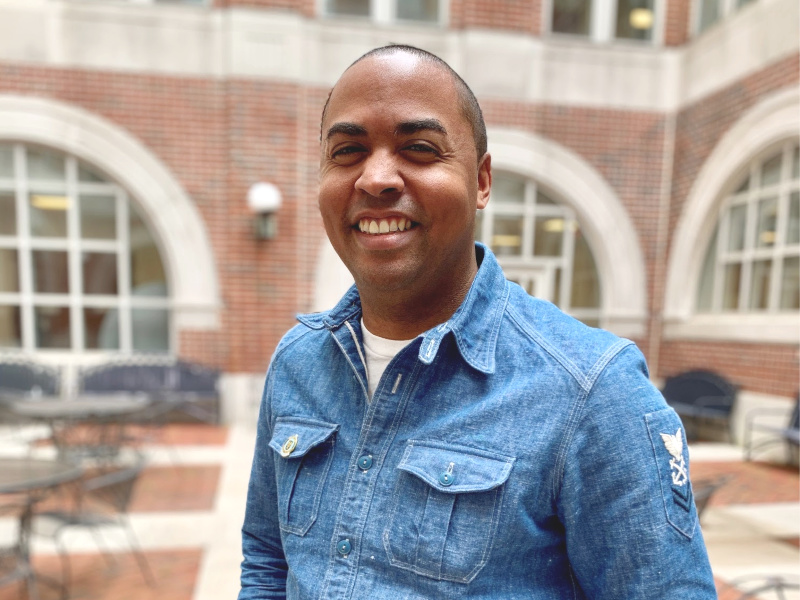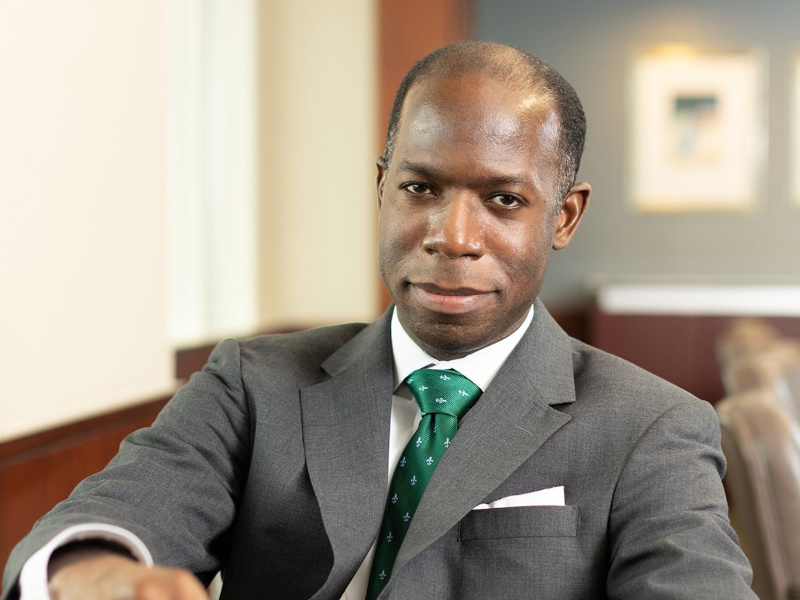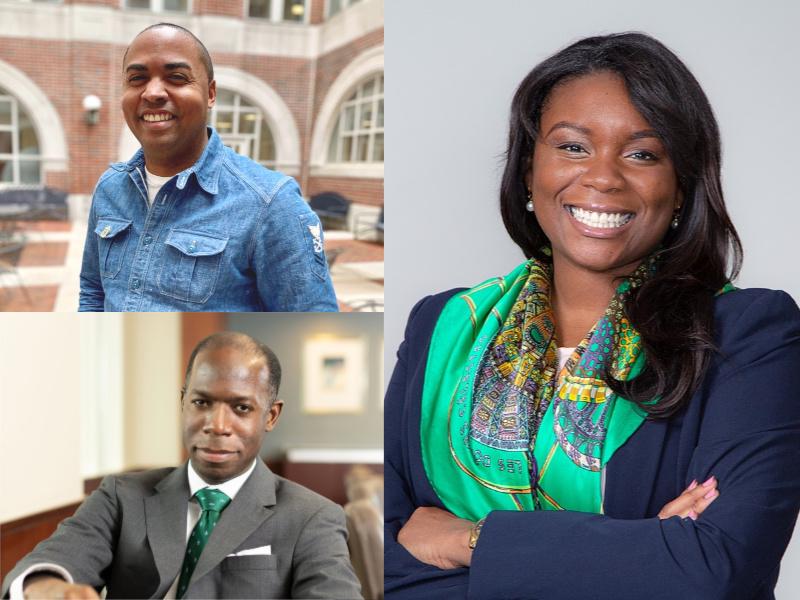Recent TLS Graduates: Where Are They Now?
Landing a job upon graduation is arguably the primary concern of most law students. The last year of law school includes an exhaustive amount of time in job interviews and networking, in preparation for the next step of a law career. We caught up with recent graduates Micah C. Zeno (L '15), Kelsanah A. Wade (L '18) and Robert A. Waldrup, USAF (L '16), to see where their law careers have taken them.

Kelsanah A. Wade (L '18)
Associate at Fragomen New York
What do you do as an associate for Fragomen?
Fragomen is a global and primarily business immigration firm. We help our clients, a majority of which are corporations, navigate the immigration system, particularly assisting companies transfer skilled employee talent to the United States from foreign countries or vice versa on a temporary or permanent basis. Families are also included in this process. Also, as much as our focus is on business immigration, we are very involved in doing pro bono work, including asylum and refugee cases, Violence Against Women Act (VAWA) cases, to name a few.
What is the most rewarding aspect of your work?
The most rewarding for me is to help connect the pieces needed to facilitate the global movement of not just people but a pool of talent who may impact the economy and culture of the world. It is important for me to know that our clients, both the companies and the foreign nationals, trust our firm to help them navigate systems that can be complicated; we are able to help give them comfort and security in knowing that life-changing moves, such as a transition from one’s home country to an unknown context and at the same time, from one job to another, can be a smooth process. Although we are helping our clients, which are mostly companies, there is still a human and compassionate aspect of business immigration which people can forget or don’t think exists. Ultimately, our goal is to have people benefit from a process that impacts their lives, and in times of uncertainty, as we are in now with the COVID-19 pandemic, working with the foreign nationals to ensure that their immigration status is in place and secure.
How does your Tulane Law degree or your experience at Tulane Law help you in your work?
By taking a number of Tulane Law courses, such as mergers and acquisitions, business enterprises, among others, and marrying this knowledge with immigration and other international law-based courses, I was able to better understand key aspects of the business immigration law practice. Our client companies regularly go through mergers and acquisitions and understanding what’s involved in this process has helped me understand the petitioning company’s changed status and how that may impact the foreign national’s status. The other experience that has helped tremendously is participating in Tulane’s study abroad programs offered during the summers. During my 1L summer, I did the Paris program which focused on Civil Law, EU Law, and a comparison of different countries’ constitutions; I also did the Berlin program, which focused on negotiation, mediation, and arbitration. During both programs, I interacted with people from all over the world on a daily basis to find common ground during mock mediations, for example. Such exercises and experiences provided me with tools and skills that I can use when interacting with clients, understanding their specific needs, concerns, and goals.
What advice do you have for future Tulane law students of color regarding the law and being a lawyer?
I would encourage them to remain open and to not limit yourself. Do not fear being the minority in whatever setting you are in because if you are, it can be very stifling, and you can miss out on major opportunities without even realizing it. Also, do not let anyone set your boundaries for you. Explore and pursue whatever field is of interest to you. It is OK to ask for help in order to achieve your goals. Also, strive to connect with people who come from different walks of life as well as those who have similar backgrounds as you. This provides so many perspectives about and insights into your career path, goals, potential hurdles, etc.

Robert A. Waldrup, USAF (L '16)
Circuit Trial Counsel, Central Circuit, for the United States Air Force
What do you do as Circuit Trial Counsel?
Essentially, we are the Air Force’s senior prosecutors. We’re called in to try complex cases – murders, rapes, sex assaults, big drug cases – all over the globe. That’s one component of the job. The other component is that we train and mentor junior counsel.
What is the most rewarding aspect of your work?
There was a sex assault case I tried several years ago. We deal with a lot of those that civilian prosecution offices might not touch. As you could probably imagine, winning convictions in these cases is difficult. With this particular one, there were no witnesses to the assault and no physical evidence; just her testimony and that of “outcry witnesses” who saw her after the assault. We didn’t win the case, but the victim was very thankful for the prosecution team, as she put it, for “giving her a voice.” Things like that are very rewarding.
Another was I was put on a case several weeks ago in Shreveport. The first prosecution team was disqualified, and we had to piece together another prosecution team from all over the country. We dropped in a week later to learn the case, develop a strategy and interview witnesses. We were building all of this from scratch and there were 40-some odd offenses. But it was a beautiful experience. When you are able to tackle a massive project like that with people you enjoy working with, that’s rewarding.
Finally, I would say that when you get a junior counsel who is responsive to the coaching we as circuit counsel are charged to deliver, that’s rewarding as well. They come a long way in their development as litigators from the beginning of the case to the end.
How does your Tulane law degree help you in your work?
I took Robert Westley’s Fourteenth Amendment class in my 2L year. That class forever changed how I view the law, read judicial opinions and think about the law. Whatever kind of lawyer I am today is so heavily informed by what I took away from that class.
Moreover, during my 2L intersession, I participated in the criminal intersession. This was the first time I recognized that I could be good in criminal law and also a decent litigator. The intercession program encouraged me to take as many criminal law classes as I possibly could, which put me in touch with the criminal law professors who mentored me quite a bit. I still talk with many of them to this day.
Finally, in the beginning of my 3L year, a partner from one of the criminal defense firms in town reached out to Jim Letten (L'79) asking for a recommendation for student-clerk. Because of my relationship with the criminal law faculty—and strong performance in their classes—I was recommended, and received a yearlong internship. I did a lot of work with them on a newsworthy case, obtained a ton of real-world experience before joining the JAG Corps. That experience carried over to the work I’ve done as a JAG for the last four years, which is directly attributable to Tulane and my education there.
What advice do you have for future Tulane law students of color regarding the law and being a lawyer?
A lot of my white law school colleagues came from households of lawyers. They had someone to help them navigate the complexities and novelty of legal education before they entered the doors, and throughout their time at Tulane. I think it’s a significant edge. Someone who doesn’t have someone who can give them that kind of information, I think, is at a bit of a disadvantage. My advice would be to find a mentor in the legal profession who can help you navigate the unique qualities of studying the law. As a 2L and 3L student, what helped me was building relationships with my professors. Even if you aren’t a research assistant, you can still drop in office hours, participate in class, and socialize at law school events so that your professors know you. Going back to my own experience, I don’t think I would have received the recommendation for my 3L internship had I just been another face in the class that did well; you’ve got to build relationships.
Moreover, I can’t stress enough how important it is for more black students to make it a goal to earn membership on the Tulane Law Review. Aside from having your name associated with the law school’s flagship journal, additional doors open up by virtue of membership. Important people at the law school take a personal interest in your professional goals. Law firms in the city hold recruitment events specifically for law review members. I met federal judges, both at the district and circuit level, I likely never would have met but for my law review membership. Certainly, you can hustle your way into top firms and federal clerkships without having served on the law review. However, the experience you gain in legal writing coupled with the prestige of association with the journal is simply too beneficial to not compete for membership. There have been, so far as I am aware, three black men in the history of the Tulane Law Review. The scholarship and intellectual inquiry on the journal itself is only enhanced with diverse students bringing diverse experiences and worldviews to the publication. I wish more black students understood that and made it a goal to get on the Law Review.
Waldrup's committment to Tulane Law and diversity led him and his classmate Gary Crosby (L'16) to establish an endowment for the Waldrup-Crosby Scholarship Fund, which is given to diverse students each year. More on the scholarship, and other diversity funds, here.

Micah C. Zeno (L '15)
Associate at the firm of Gordon, Arata, Montgomery, Barnett, McCollam, Duplantis & Eagan, LLC.
What do you do as an associate?
I support the partners at my firm in representing commercial clients in complex litigation, appellate practice, risk management, and, occasionally, transactional matters because of my banking background. My practice is primarily litigation, though, and most of what I’ve done to date includes drafting briefs and oral argument in federal and state court.
What is the most rewarding aspect of your work?
I’ve been able to leverage what I’ve learned since graduating from law school—as a law clerk and now a practicing attorney—to help other students coming behind me. Being involved in organizations that support students of color has been a big deal for me. When I was in law school, my BLSA Big Sib’ [short for “Big Sibling”], Cherie Teamer (L '14), was a big help for me. Cherie was calling me and giving me tips on law school weeks before I started my first semester. She’s still a mentor to me to this day. Literally, I talked to her last week and a few years ago we coached the BLSA mock trial teams together. Michael Razeeq (L '14) was also a big role model and mentor for me during law school. He supported me on a major Tulane Inn of Court project, we were interns together at Entergy, and he was always giving me advice on preparing for life after law school. Michael was always looking out for me. Judge Roby (L '87) once said that as long as you’re living, you should be learning and blessing others. That’s what I’m trying to do—just like others did for me.
How does your Tulane Law degree or your experience at Tulane Law help you in your work?
On our first day of orientation, Dean Meyer made a speech about Abraham Lincoln, who once suggested that the law could be studied in isolation. The Dean offered us an alternative and suggested that the greater fulfillment in the practice of law is by being in a diverse community of practitioners who are intellectually curious and share a common love of the law. I’ve tried to carry that forward with me to understand that there is something I can learn from every person I work with. There is a value in understanding how a person’s experiences have impacted their practice, and how that may inform and enrich my own practice and perspectives on the law.
What advice do you have for future Tulane law students of color regarding the law and being a lawyer?
Find a good support team. I have a really good support team, classmates of mine. Their support has been the key to my success in being able to endure some of the challenges that lawyers face in general, but particularly those of color.
The other thing I suggest is to find a way to balance your practice with paving a pathway for someone else to come behind you. Do things in such a way that make it easier for the next student of color, whether at your firm or place of practice, or you help ease the transition from law school into private practice, or college to law school. It could be a major program or scholarship, like the endowment Robert [Waldrup] and Gary [Crosby] founded. It could be mentoring one individual student. That can really make a big difference in that student’s life. The reality is, it’s not easy to be a minority attorney and a mentor. It’s tough. Your time is already stretched thin, but “to whom much is given, much is required.” It’s incumbent upon us to try give back to those who are following behind us.

